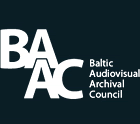BAAC Riga 2006 - a steady exchange of experiences and opportunities

The Ambience of a City
The BAAC Riga 2006 is just not a conference experience and the BAAC General meeting, it is also the BAAC board meetings, the conference planning meetings with the IASA-colleagues for the joint conference 2007, months of planning and administrating for our host organization Latvian Television and the BAAC board. It is the very ambience of the place – of Riga. I will try elaborate on this as well as all the other ingredients mentioned above. But let me emphasize already here, even though “commissioned” by the BAAC board to make this report, it is sifted
 Even though I have now been to Riga more than a half a dozen times in this work with establishing a body for cooperation between audiovisual archives around the Baltic, the city still surprises me with its charm and new experiences and views. Maybe it is the mixture of its location on the shore of the Baltic Sea with the visible layers of its architectural history and vibrant expansive modernity. Always be sure to take some time for a stroll when you visit and enjoy a few of my snapshots!
Even though I have now been to Riga more than a half a dozen times in this work with establishing a body for cooperation between audiovisual archives around the Baltic, the city still surprises me with its charm and new experiences and views. Maybe it is the mixture of its location on the shore of the Baltic Sea with the visible layers of its architectural history and vibrant expansive modernity. Always be sure to take some time for a stroll when you visit and enjoy a few of my snapshots!
 Just take in the ambience of the building in the center of the Old City that was the base of this year´s activities – the house of Fraternitas Latviensis at Aldaru iela.
Just take in the ambience of the building in the center of the Old City that was the base of this year´s activities – the house of Fraternitas Latviensis at Aldaru iela.
BAAC Board meetings
The BAAC board met on Thursday 21 to finalize the details of this year´s conference programme and the agenda of BAAC general meeting.
 The board meeting was followed by a planning meeting for the joint BAAC-IASA conference 2007, which is also the annual IASA world conference of this year. Participating from IASA was the Secretary General Gunnel Jönsson and the Vice President Jacqueline von Arb. The host organization Latvian Television was represented by Selga Laizāne, director of LTV Channel 1 and Iveta Lepesko, administrator.
The board meeting was followed by a planning meeting for the joint BAAC-IASA conference 2007, which is also the annual IASA world conference of this year. Participating from IASA was the Secretary General Gunnel Jönsson and the Vice President Jacqueline von Arb. The host organization Latvian Television was represented by Selga Laizāne, director of LTV Channel 1 and Iveta Lepesko, administrator.
Apart from the decision of establishing a business plan, the three organizers also set up and signed a “Letter of Intent” stating their respective roles for the event. Then there were only a few items to solve and agree on: Theme for the conference? (Building an Archive for the Future), call for papers, marketing of the event, venue, finding sponsors and exhibitors, training sessions, panels, social events, farewell dinner, key note speaker, how many delegates do we expect to come (> 200?), interpreters, internal meeting of respective organizations, lunch for delegates, negotiate hotel accommodations etc. etc. You name it!
The detailed arrangement of everything was then handed over with warm hands to the organizing committee.
“Audiovisual Archives: Access and Service in the Public Interest”
The theme for this year´s conference: “Audiovisual Archives: Access and Service in the Public Interest” had attracted the interest of almost 80 delegates. So the conference was a success even before it started.
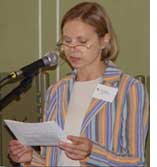
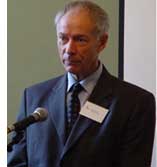 At international events like this, the manifest support through addresses at the opening of the conference by high-level representatives is very important. After the opening of the conference by the BAAC President Piret Noorhani (Estonian Literary Museum) the conference chair Andris Kesteris, (Library and Archives Canada) had the pleasure of introducing the Norwegian Ambassador to Latvia, H.E. Nils Olav Stava, one of the sponsors of the event; Selga Laizane, LTV, host organization since several years; Jacqueline von Arb, Vice President IASA and Janis Kukainis, World Federation of Free Latvians. All of them revealing interesting links to the importance of audiovisual archiving and of making audiovisual archives accessible to the public.
At international events like this, the manifest support through addresses at the opening of the conference by high-level representatives is very important. After the opening of the conference by the BAAC President Piret Noorhani (Estonian Literary Museum) the conference chair Andris Kesteris, (Library and Archives Canada) had the pleasure of introducing the Norwegian Ambassador to Latvia, H.E. Nils Olav Stava, one of the sponsors of the event; Selga Laizane, LTV, host organization since several years; Jacqueline von Arb, Vice President IASA and Janis Kukainis, World Federation of Free Latvians. All of them revealing interesting links to the importance of audiovisual archiving and of making audiovisual archives accessible to the public.
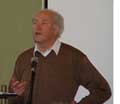 Then the link to the key note speaker of this conference, Erik Rudeng, Director of Fritt Ord (The Freedom of Expression Foundation, Norway) was natural: “Freedom of speech – the future value of audiovisual archives in a democratic society”.
Then the link to the key note speaker of this conference, Erik Rudeng, Director of Fritt Ord (The Freedom of Expression Foundation, Norway) was natural: “Freedom of speech – the future value of audiovisual archives in a democratic society”.
The first plenary session was opened by Pelle Snickars, Swedish national audiovisual archives SLBA, introducing the term “Media archaeology” to this audience. I think the choice of illustrating his thesis with a long clip from a 1929 silent film on Riga (SVT TV-archives) by the famous Swedish cinematographer Gustav Boge was brilliant. It contains a number of long shots and pans – apart from that it is complete with its original texts – and that gives it unique possibilities of extracting information of a bygone Riga.
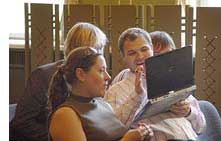 Preserve and document your collections. Fine! But without the steady input of ideas on how to “capitalize” them for programming, scholarly research or the interest of the general public, you are in serious trouble finding funds for your archive. That is one of the reasons why our conferences are so important. Svein Sandnes, pictured the challenge to use archive material for educational purposes at the NRK in Oslo.
Preserve and document your collections. Fine! But without the steady input of ideas on how to “capitalize” them for programming, scholarly research or the interest of the general public, you are in serious trouble finding funds for your archive. That is one of the reasons why our conferences are so important. Svein Sandnes, pictured the challenge to use archive material for educational purposes at the NRK in Oslo.
But sources of moving images for reuse are also provided by the example of various national bodies for enhancing production of fiction film, like the Latvian National Film Centre. Andrejs Apsitis gave us a presentation of this institution.
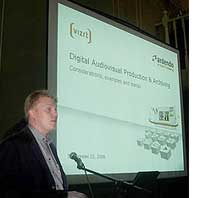 The second plenary session of this first day continued on the access theme from such different angles as Nordic-Baltic News Exchange (a presentation by Åsulv Edland, NRK), technical solutions to facilitate access, production and broadcast from the SVT experience with an existing digital file “grain-to-loaf”-system (Jonas Engström, CEO, Ardendo & Eva-Lis Green, Media Controller, SVT), a “run down” on how to migrate your entire video collection to digital files (Lasse Nilsson, Project Manager, SVT) and providing access for the general public to the audiovisual archives they have actually paid for – “Open Archives: A new service to the Swedish and World Audience” (Ove Wahlqvist, SVT). I don´t think anyone could complain about either the width or comprehensiveness of the scope!
The second plenary session of this first day continued on the access theme from such different angles as Nordic-Baltic News Exchange (a presentation by Åsulv Edland, NRK), technical solutions to facilitate access, production and broadcast from the SVT experience with an existing digital file “grain-to-loaf”-system (Jonas Engström, CEO, Ardendo & Eva-Lis Green, Media Controller, SVT), a “run down” on how to migrate your entire video collection to digital files (Lasse Nilsson, Project Manager, SVT) and providing access for the general public to the audiovisual archives they have actually paid for – “Open Archives: A new service to the Swedish and World Audience” (Ove Wahlqvist, SVT). I don´t think anyone could complain about either the width or comprehensiveness of the scope!
The afternoon was seasoned with a third panel session that concentrated on bringing primarily literary collections to digital access (Marju Mikkel and Marin Laak, Estonian Literary museum, Aldis Putelis, Archives of Latvian Folklore) and a parallel workshop on the digitization of TV-production and broadcast.
The problem after such a day´s programme is that you feel rather “stuffed”. Luckily the day ended with a reception hosted by the Norwegian Embassy. Anita Helland greeted the delegates with a few words on why the Embassy has showed an interest especially in the audiovisual archiving area.
 The first session on Sunday morning spanned the area of “Picture/photo evaluation with reference to historical events and audiovisual archives” conveyed by professor Knut Kjeldstadli, University of Oslo, a research project on “Foreign news and historical research – the year 1968” at Volda University College in Norway (Ass. Professor Rolf Werenskjold), the video testimonies collection of the Occupation Museum of Latvia, Riga (Lelde Neimane) and a vivid overview on preservation of film and video archives ( David Walsh, Imperial War Museum, London). In short: Why, what for and how with audiovisual archives!
The first session on Sunday morning spanned the area of “Picture/photo evaluation with reference to historical events and audiovisual archives” conveyed by professor Knut Kjeldstadli, University of Oslo, a research project on “Foreign news and historical research – the year 1968” at Volda University College in Norway (Ass. Professor Rolf Werenskjold), the video testimonies collection of the Occupation Museum of Latvia, Riga (Lelde Neimane) and a vivid overview on preservation of film and video archives ( David Walsh, Imperial War Museum, London). In short: Why, what for and how with audiovisual archives!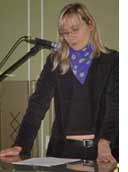 With such a chunk of solid knowledge to take in, the delegates deserved their coffee break.
With such a chunk of solid knowledge to take in, the delegates deserved their coffee break.
The following sessions menu contained such items as Public-Private Partnership (PPP) as a strategy for digitization from an Norwegian example (Jacqueline von Arb, Stavanger), how the audio collections were offered to the public at Estonian public libraries ( Meery Salu, Tartu City Library), how to use the web for access to museum archives in Lithuania ( Živile Ambrasaitė, Lithuanian Theatre, Music and Cinema Museum), audiovisual archives we don´t even know exists – Baltic Archives in Exile (Andris Kesteris, Library and Archives Canada).
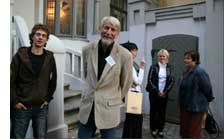 Since access was one of the main themes for this conference, The Estonian Film Archives shared their experiences on the topic through Lea Tegelmann. An audiovisual archives conference without stills and the press represented on the programme is of course impossible. Sulev Sepp (Scanpix Baltics) gave us new input on “dynamic access” to audiovisual archives as did Inga Vilcane, Riga newspaper Diena from her special niche.
Since access was one of the main themes for this conference, The Estonian Film Archives shared their experiences on the topic through Lea Tegelmann. An audiovisual archives conference without stills and the press represented on the programme is of course impossible. Sulev Sepp (Scanpix Baltics) gave us new input on “dynamic access” to audiovisual archives as did Inga Vilcane, Riga newspaper Diena from her special niche.
A few sips of fresh air and the delegates were “corralled” (smokers are difficult people – archivists or not) again for BAAC General Business Meeting chaired by the BAAC President Piret Noorhani.
PN presented the annual (2005/2006) report, with emphasis on the formal activities for establishing the BAAC (registration, bank account, new website etc.)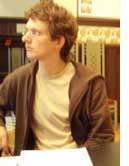 The membership got a vivid presentation of the BAAC website - www.baacouncil.org - by the webmaster Juozas Markauskas, Vilnius University, Lithuania.
The membership got a vivid presentation of the BAAC website - www.baacouncil.org - by the webmaster Juozas Markauskas, Vilnius University, Lithuania.
About the membership PN underlined the importance of widening the membership, both in the sense of the number and the variety of audiovisual archives. BAAC now has 15 individual members and seven institutional.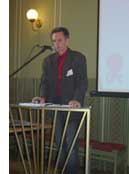 Aldis Putelis, Archives of the Latvian Folklore, was elected new member of the BAAC board as well as Secretary-Treasurer. Elected as audit panel Reet Harkmaa, ETV, Estonia; Maira Dudareva, Diena, Latvia; Eha Väinsalu, ETV, Estonia.
Aldis Putelis, Archives of the Latvian Folklore, was elected new member of the BAAC board as well as Secretary-Treasurer. Elected as audit panel Reet Harkmaa, ETV, Estonia; Maira Dudareva, Diena, Latvia; Eha Väinsalu, ETV, Estonia.
A board of editors for the website was also elected: Juozas Markauskas, Lasse Nilsson and Andris Kesteris. They are part of the action for 2006/2007 which emphazises the further development of the website. The plan also paid special attention to training, stemming from a proposal by Tedd Urnes (NRK, Norway) on setting up “training task-forces” in connection with regional events. An important item on the list is of course the joint BAAC-IASA conference next year in Riga.
A good conference is often extended in time with optional events like excursions. That also goes for this year´s BAAC Riga. Both LTV and the Occupation Museum generously offered guided visits Sunday morning.
 Lasse Nilsson, BAAC Board
Lasse Nilsson, BAAC Board
(SVT, Sweden)
